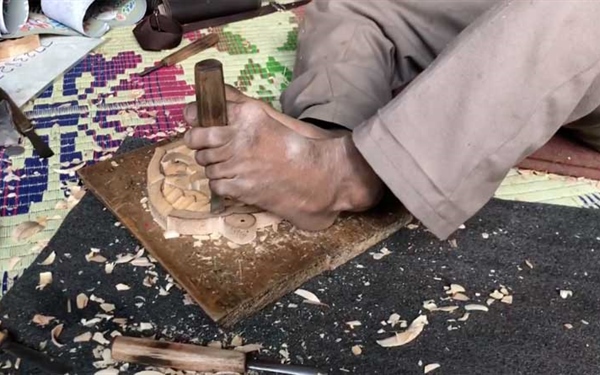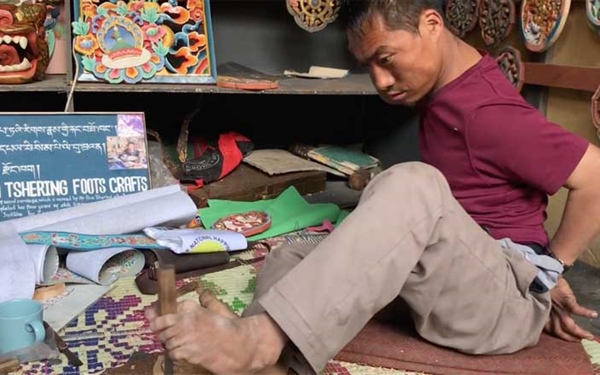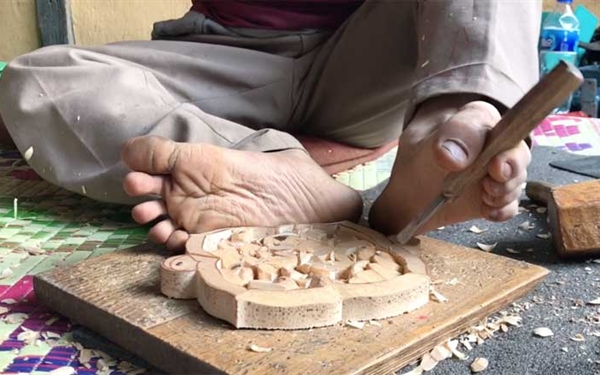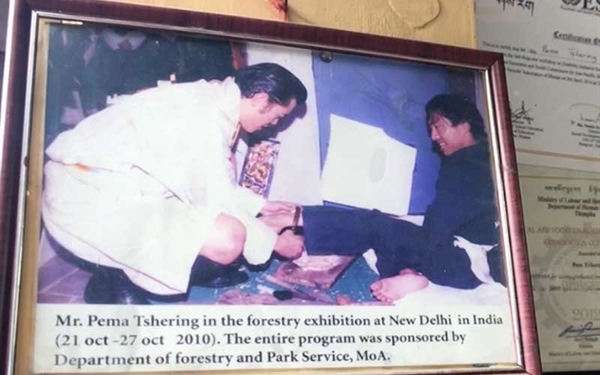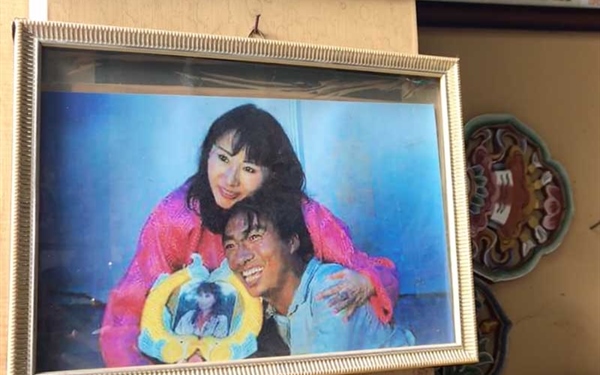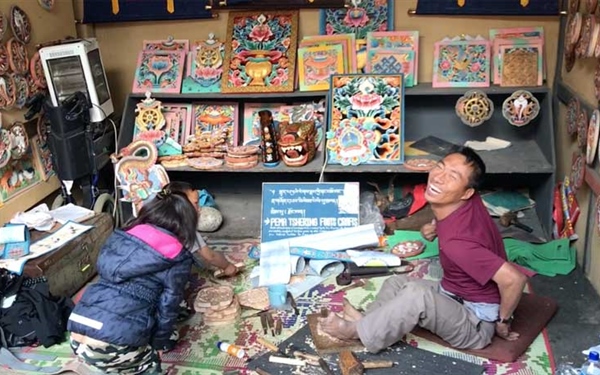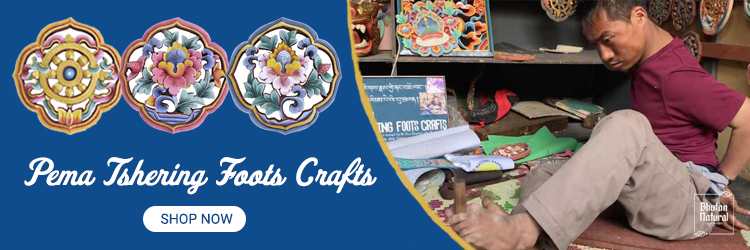Meet Bhutan's cerebral palsy 'foot' artist Pema Tshering
He was abandoned after his parents found out he had cerebral palsy. But a chance meeting with the Queen Mother turned his life around.
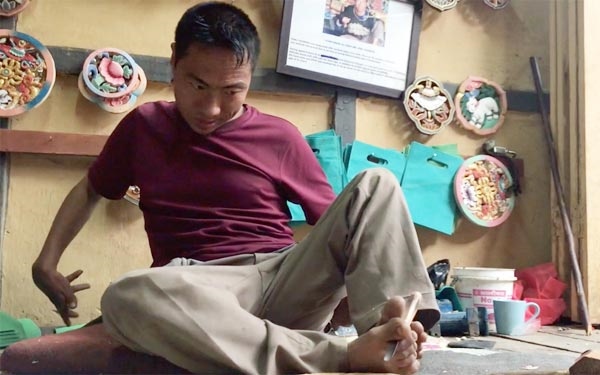 Pema Tshering uses only his feet to create artwork.
(Source: Bhutan Times)
Pema Tshering uses only his feet to create artwork.
(Source: Bhutan Times)
By Kinley Yangden | Bhutan Times
He was diagnosed with cerebral palsy when he was a child, but that has not stopped artist Pema Tshering from being one of the most recognised painters and wood-carvers in Bhutan.
Using only his feet, Pema holds a chisel and hammer, nimbly carving his way through a piece of wood as he tells us his story about being abandoned at birth, encountering the Queen Mother who subsequently adopted him, and how he eventually became an artist.
Paralysed from the hip up, the 31-year-old artist has lived almost his entire life using his feet as his hands. Despite his handicap, Pema has managed to eke out a living selling his creations at a small shop set up inside the compounds of Simply Bhutan museum in Thimphu.
During our visit there, someone jokingly told us that Pema is a celebrity in Bhutan. And indeed so, for the artist has not only managed to create beautiful artwork – mostly religious art – but also once represented Bhutan in the 2005 Paralympics as a national archer.
His endurance and strength despite his physical and emotional challenges is a testament to the human spirit, and his story deserves to be told to the world.
Abandoned by his parents when he was 6
Except that he was born in Mongar district to farmer parents, Pema does not reveal much about his early childhood. The one thing he has to tell was that he was abandoned at the tender age of six when his parents found out that he had cerebral palsy.
But it wasn’t just this impairment that they had to deal with – Pema also had congenital deformities in his spinal column, resulting in limited use of his legs.
Left to his grandparents’ care, Pema started learning how to use his feet as his hands. For 20 years, he lived in the village making bows and arrows out of bamboo. Education was out of the question.
Then, came a visitor who’d change his life forever.
Meeting the Queen Mother
When Pema was 18, Her Majesty the Queen Mother Tshering Pem Wangchuk paid a visit to his village, where she chanced upon him.
When asked how he felt meeting the Queen Mother, Pema told Bhutan Times that he was “very happy and excited” to see her.
“She asked if there was anything that I wanted. I told her I wanted to go to school. I didn’t want money or anything else,” said Pema.
The Queen Mother then sponsored his education at Bhutan’s renowned art school Institute of Zorig Chusum in Thimphu. It was here where Pema learnt how to carve and paint. The decision to pursue arts was a practical one.
“I didn’t mind doing any job but I didn’t think I was fit to do some jobs, as I didn’t go to school and didn’t have knowledge. So I decided to choose to learn carving and painting,” said Pema, who now sells his works at a small craft workshop, which was set up by the Queen Mother at Simply Bhutan.
Cost of Pema’s works range from 600 Nu for a small wooden craftwork to 25,000 Nu for a thangka painting. By selling his works, he is able to make at least US$100 a month.
When asked if he’s happy with what he’s doing, Pema says he usually is, but sometimes felt like there was a lot of work to do, as it takes about three days for him to create a small piece of wooden artwork to one week for bigger ones. Thangka paintings take around two to three weeks to create.
Looking at his creations and paintings, one would not know they were done by a person who lacked the capability to use his hands. Pema’s works are intricate and challenging: Ranging from dragons to floral patterns and to the Eight Auspicious Signs, Pema has sold a number of his creations. And on one occasion, also exhibited his works in New Delhi in 2010.
Supporting his parents
He’s done well in his line of work that he now supports his parents financially – a responsibility he feels he has to take on despite their decision to abandon him when he was a child.
Pema shared his philosophy behind this: “I want to help my parents because if you don’t help your parents, it’s like disrespecting them. If you don’t respect your parents, whatever work you do, you’ll be unsuccessful in life.”
He is in the midst of building a two-storey house for them in Mongar, which he says is almost completed.
“I’m not angry with them (my parents). I’m just sad. I’ll be happier if they had put me in school, rather than abandoning me,” said Pema, when asked if he bears any anger or resentment towards his parents.
He also said that his parents are now “very proud” of him.
Participated in 2005 Bhutanese Paralympics
Besides establishing a career in art, Pema also participated in the 2005 Bhutanese Paralympic as an archer.
“I didn’t get a medal but I received a certificate of participation,” laughed Pema, who pointed at the framed certificates hanging in his workshop.
He added that he still plays archery for fun and hopes to participate in an upcoming Paralympic game again.
Big dreams
Despite his predicament, Pema has big dreams he hopes to achieve.
“I want to be an art teacher. I don’t have any students now but I plan to teach,” said Pema.
He added that he hopes to work in New York for a few years before returning to Bhutan to teach art and start his own carving business.
While it has been challenging and tiring for him, Pema said that the most difficult time of his life was when he did not receive any education. He said would have liked to study to become a teacher or a minister.
“Why a minister?” we asked, to which Pema laughed and responded: “So that I can help the needy.”
Pema Tshering’s “Foot Craft” workshop is located at Simply Bhutan, Thimphu.


